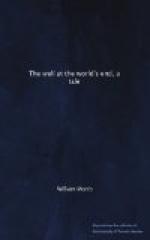Art thou man, art thou maid, through the
long grass a-going?
For short shirt thou bearest,
and no beard I see,
And the last wind ere moonrise about thee
is blowing.
Would’st thou meet with
thy maiden or look’st thou for me?
Bright shineth the moon now, I see thy
gown longer;
And down by the hazels Joan
meeteth her lad:
But hard is thy palm, lass, and scarcely
were stronger
Wat’s grip than thine
hand-kiss that maketh me glad.
And now as the candles shine on us and
over,
Full shapely thy feet are,
but brown on the floor,
As the bare-footed mowers amidst of the
clover
When the gowk’s note
is broken and mid-June is o’er.
O hard are mine hand-palms because on
the ridges
I carried the reap-hook and
smote for thy sake;
And in the hot noon-tide I beat off the
midges
As thou slep’st ’neath
the linden o’er-loathe to awake.
And brown are my feet now because the
sun burneth
High up on the down-side amidst
of the sheep,
And there in the hollow wherefrom the
wind turneth,
Thou lay’st in my lap
while I sung thee to sleep.
O friend of the earth, O come nigher and
nigher,
Thou art sweet with the sun’s
kiss as meads of the May,
O’er the rocks of the waste, o’er
the water and fire,
Will I follow thee, love,
till earth waneth away.
The monk hearkened to him with knitted brow, and as one that liketh not the speech of his fellow, though it be not wise to question it: then he went out of the chamber, but left the pair of beads lying in the window. But Ralph clad himself in haste, and when he was fully clad, went up to the window and took the beads in his hand, and looked into them curiously and turned them over, but left them lying there. Then he went forth also, and came into the forecourt of the house, and found there a squire of the men-at-arms with his weapons and horse, who helped him to do on his war-gear.
So then, just as he was setting his foot in the stirrup, came the Brother again, with his face once more grown smiling and happy; and in his left hand he held the chaplet, but did not offer it to Ralph again, but nodded his head to him kindly, and said: “Now, lord, I can see by thy face that thou art set on beholding the fashion of this world, and most like it will give thee the rue.”
Then came a word into Ralph’s mouth, and he
said:
“Wilt thou tell me, father, whose work was the
world’s fashion?”
The monk reddened, but answered nought, and Ralph spake again:
“Forsooth, did the craftsman of it fumble over his work?”
Then the monk scowled, but presently he enforced himself to speak blithely, and said: “Such matters are over high for my speech or thine, lord; but I tell thee, who knoweth, that there are men in this House who have tried the world and found it wanting.”




